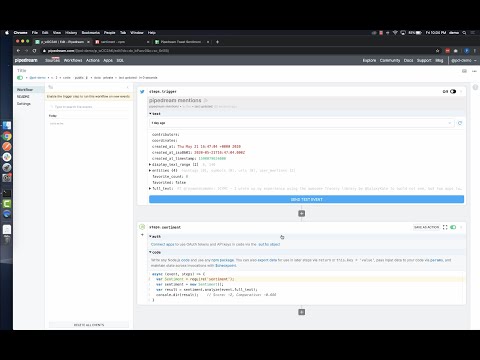What do you want to automate
with Google Sheets and Beanstalk?
Prompt, edit and deploy AI agents that connect to Google Sheets, Beanstalk and 3,000+ other apps in seconds.
Trusted by 1,000,000+ developers from startups to Fortune 500 companies
Popular Ways to Connect Google Sheets with Beanstalk#
Popular Google Sheets and Beanstalk Triggers#
Emit new event when a new changeset is created. See the docs
Emit new event when a new repository is created. See the docs
Emit new event when selected flags trigger the webhook. See the docs
Emit new event each time a comment is added to a spreadsheet.
Popular Google Sheets and Beanstalk Actions#
Add a single row of data to Google Sheets. Optionally insert the row at a specific index (e.g., row 2 to insert after headers, shifting existing data down). See the documentation
Creates a new code review. This action is essentially the same as clicking the “Request review” button in the app. See the docs
Add multiple rows of data to a Google Sheet. See the documentation
Get all values or values from a range of cells using A1 notation. See the documentation
Overview of Google Sheets#
The Google Sheets API allows for the creation, reading, updating, and deletion of data within Google Sheets, enabling a robust platform for spreadsheet management and data manipulation. Through Pipedream, you can craft serverless workflows that respond to various triggers, such as webhook events, emails, or scheduled times, to interact with Google Sheets. This synergy can automate reporting, synchronize data across applications, manage inventory, track leads in a CRM, or even conduct survey analysis by updating and retrieving sheet data on the fly.
Connect Google Sheets#
import { axios } from "@pipedream/platform"
export default defineComponent({
props: {
google_sheets: {
type: "app",
app: "google_sheets",
}
},
async run({steps, $}) {
return await axios($, {
url: `https://www.googleapis.com/oauth2/v1/userinfo`,
headers: {
Authorization: `Bearer ${this.google_sheets.$auth.oauth_access_token}`,
},
})
},
})
Overview of Beanstalk#
The Beanstalk API allows for streamlined version control and release management within your development workflow. By leveraging the API with Pipedream, you can automate interactions with your repositories, changesets, and deployment environments. You can create workflows that react to code commits, manage deploy environments, and integrate with other services for a more cohesive development lifecycle.
Connect Beanstalk#
import { axios } from "@pipedream/platform"
export default defineComponent({
props: {
beanstalkapp: {
type: "app",
app: "beanstalkapp",
}
},
async run({steps, $}) {
return await axios($, {
url: `https://${this.beanstalkapp.$auth.domain}.beanstalkapp.com/api/account.json`,
headers: {
"Content-Type": `applicaton/json`,
"User-Agent": `Pipedream (support@pipedream.com)`,
},
auth: {
username: `${this.beanstalkapp.$auth.username}`,
password: `${this.beanstalkapp.$auth.access_token}`,
},
})
},
})
Related Videos#



Community Posts#


